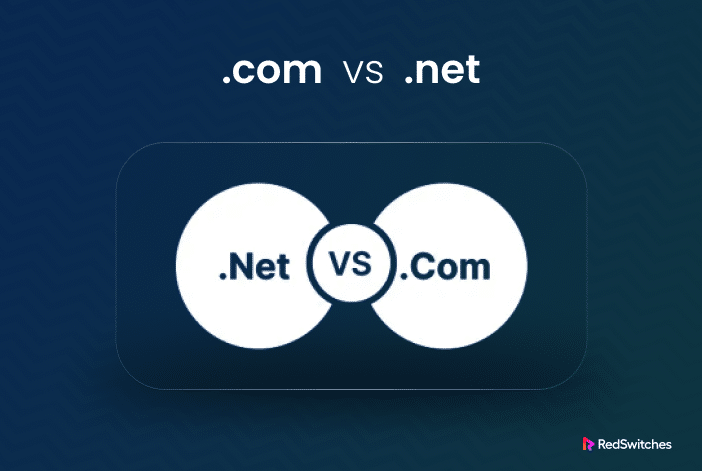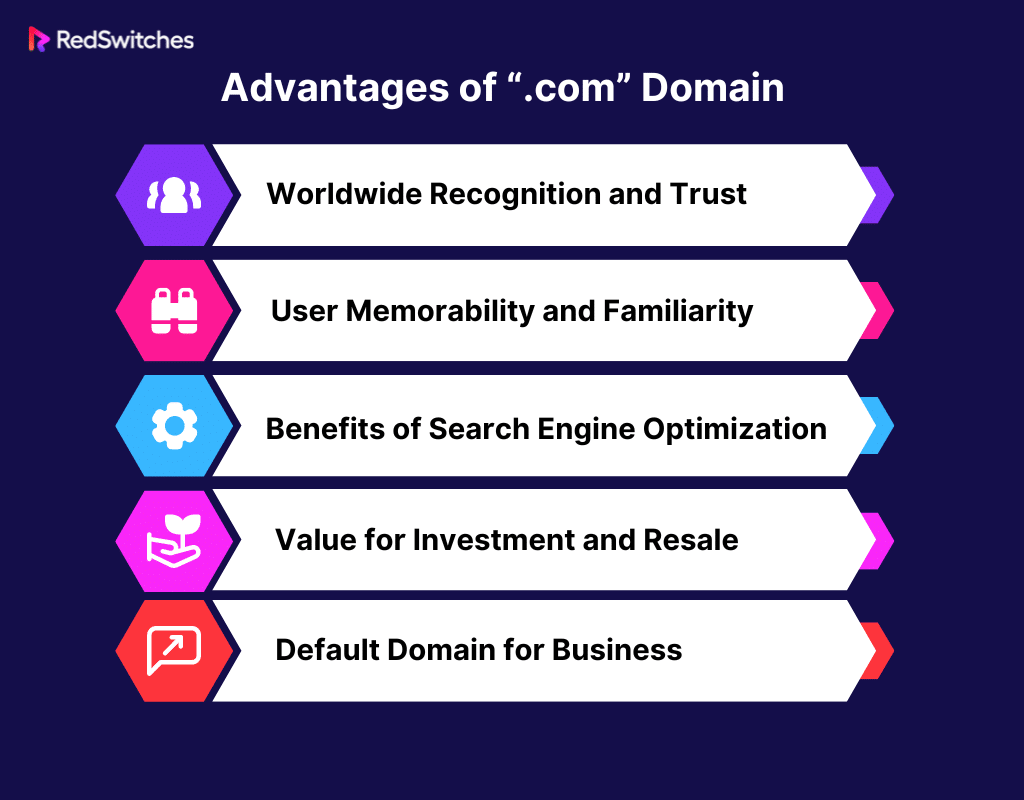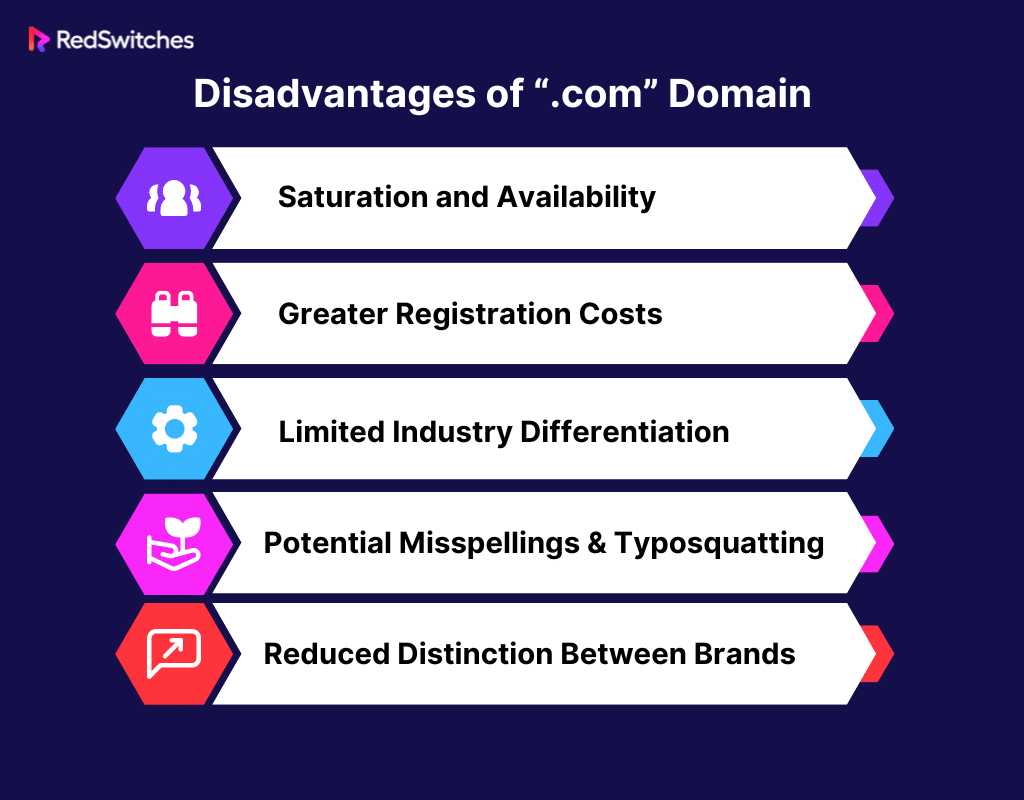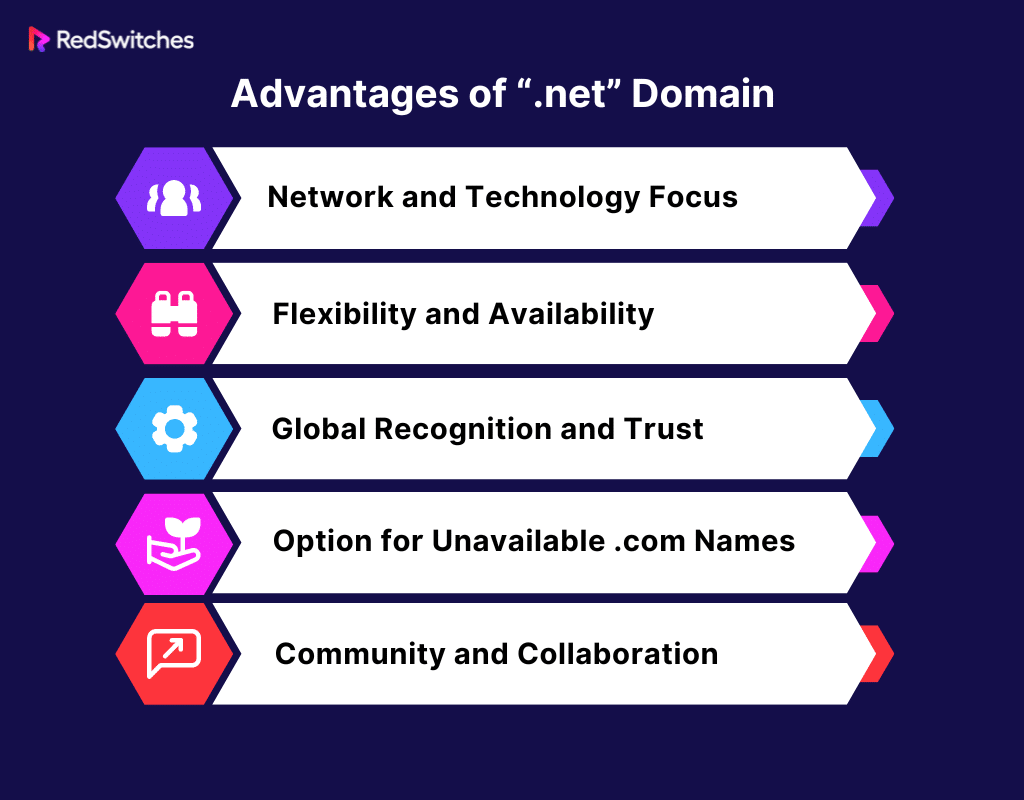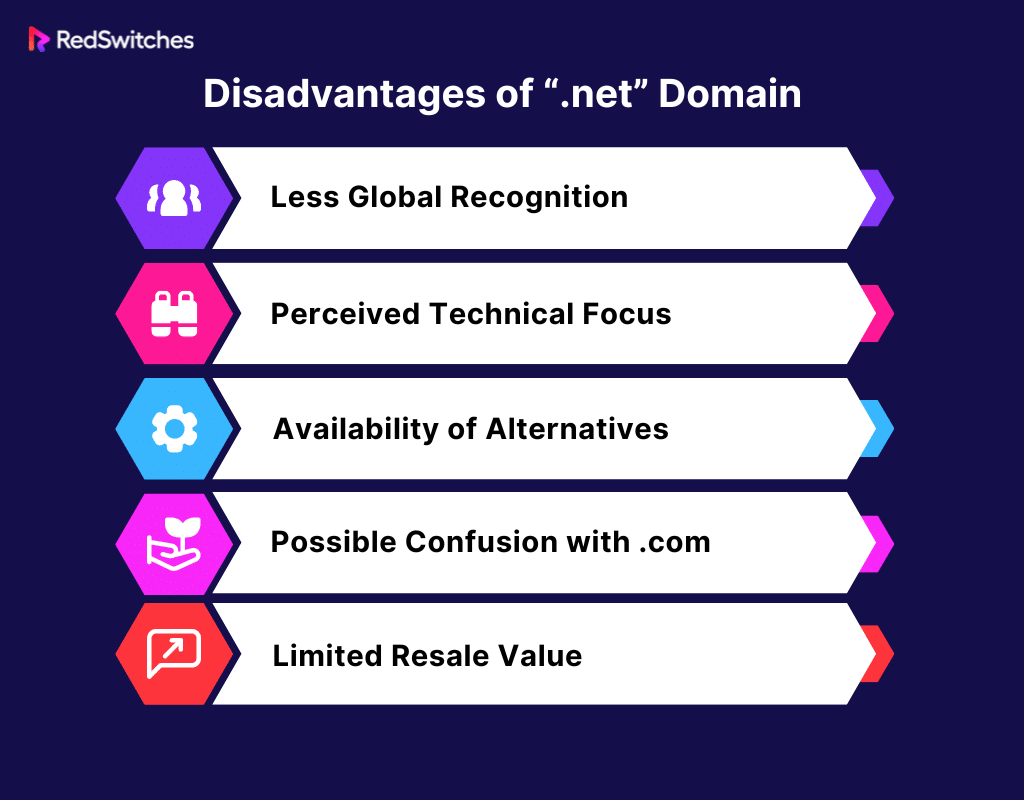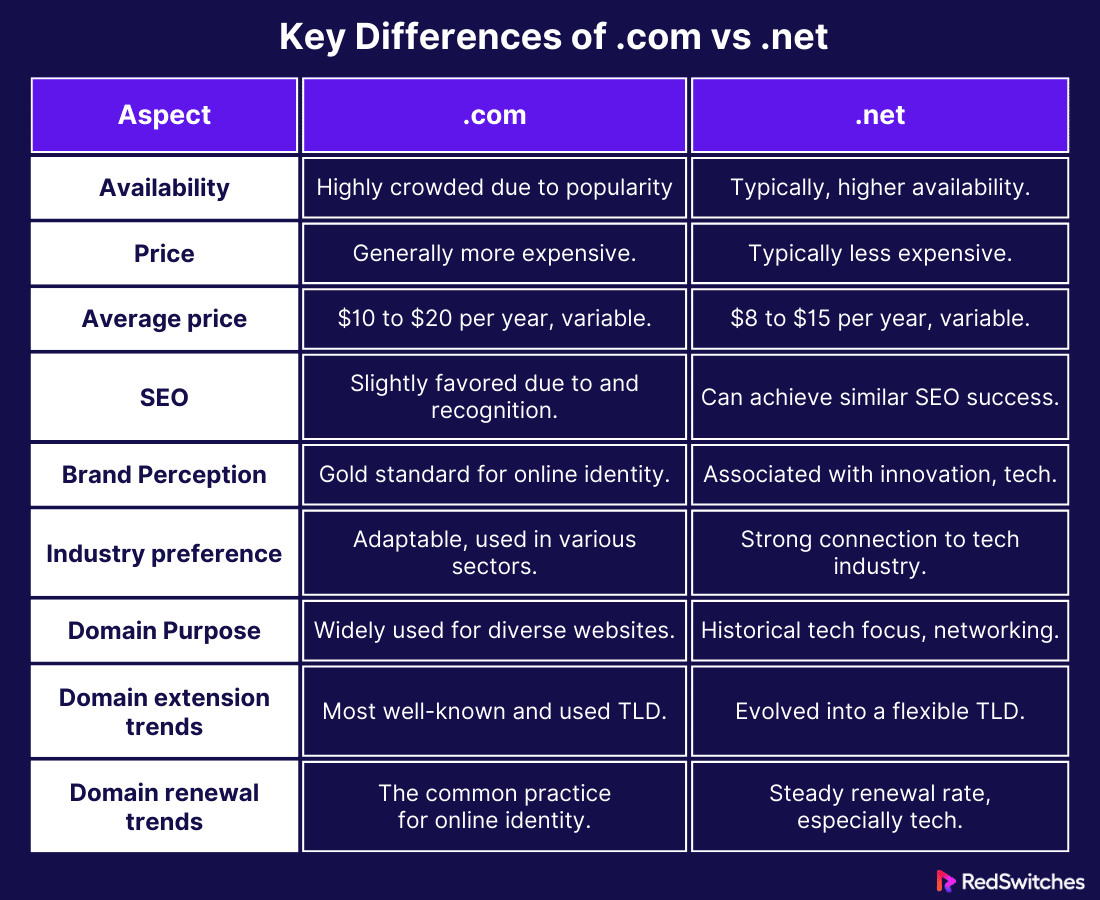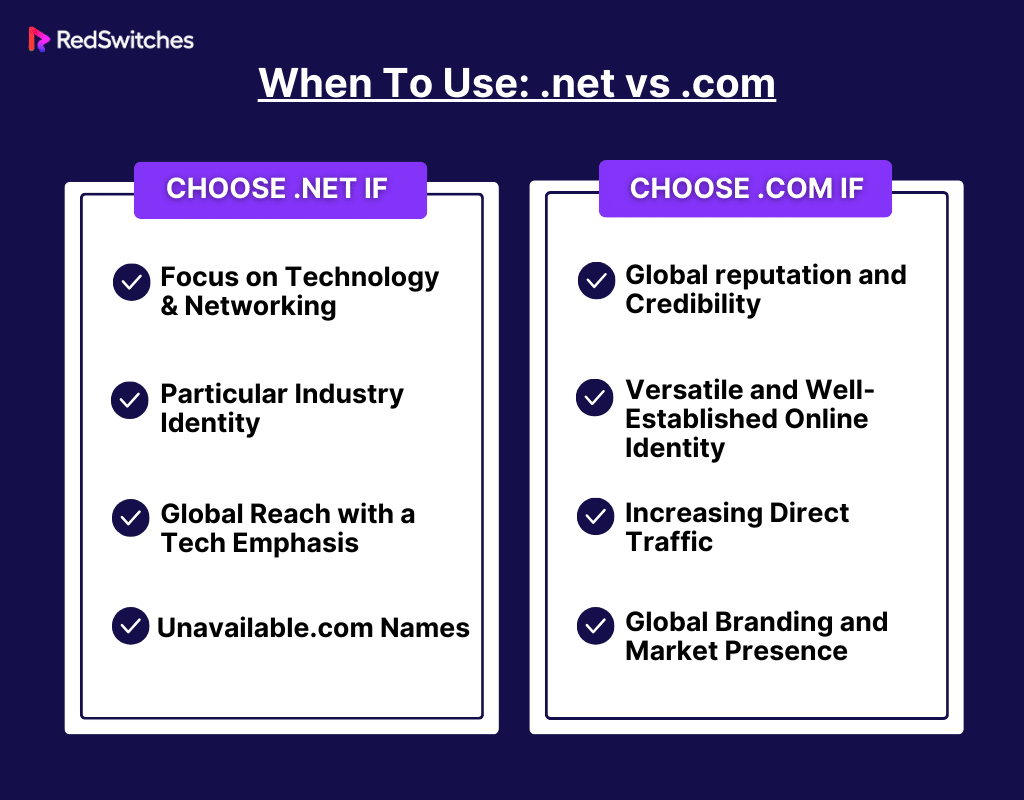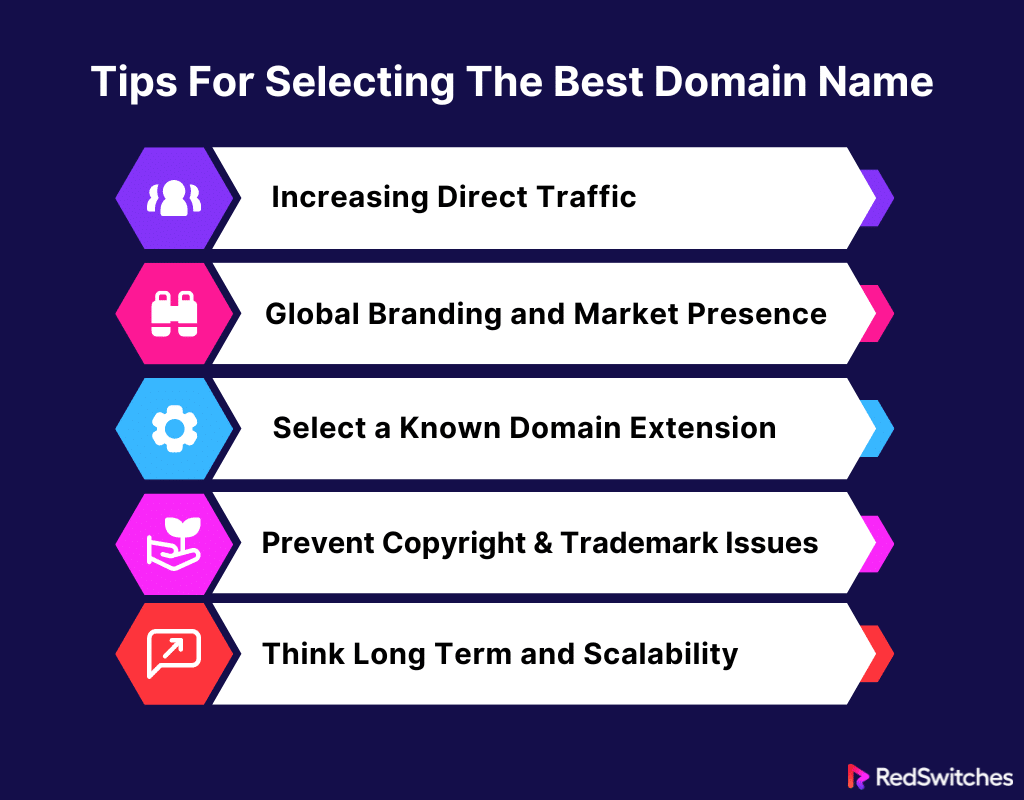Key Takeaways
- Widely recognized and trusted, .com domains are preferred for their global appeal and credibility across various industries.
- Originally intended for network-related entities, .net domains are a good fit for technology, networking, or IT-focused businesses.
- Due to the saturation of .com domains, finding a concise and relevant .com domain can be challenging.
- Both .com and .net domains can achieve similar SEO success with proper optimization.
- Choosing between .com and .net should align with your branding and market presence strategy.
- Select a domain that aligns with your long-term vision and scalability.
Choosing the right domain extension is very important when setting up a website. In domain names, .com and .net are the most popular and widely used extensions. When choosing between both, it’s essential to consider your specific needs and goals.
Both .com and .net domain extensions are viable for business websites, but it’s crucial to consider their differences before deciding. When you decide between .com and .net, you’re not just selecting a web address but also giving your audience a hint about your website – its content, services, or mission.
If your business is technology- or networking-related, a .net domain might be more suitable. A .com domain is the preferred choice for most businesses due to its widespread recognition and credibility.
Join us as we unveil the 10 key differences illuminating the path through the .com vs .net debate, guiding you toward the perfect digital identity for your endeavors in the World Wide Web’s ever-evolving landscape. We will aim to clear your doubts regarding the difference between com and net.
Table of Contents
- Key Takeaways
- What is a Domain Name Extension?
- What is a .com Domain Extension?
- What is a .Net Domain Extension?
- Key Differences of .com vs .net
- .net vs .com: When To Use
- Tips for Selecting the Best Domain Name
- How To Buy .net vs .com Domains
- Conclusion
- FAQs
What is a Domain Name Extension?
Credits: Freepik
A domain name extension, or top-level domain (TLD), is the suffix that follows the domain name in a web address. It is the combination of characters following the period in a web address, such as “.com,” “.net,” or “.org.” Let’s see an example. For instance, the main page of WordPress emphasizes its domain, e.g. WordPress.org.
Visitors can learn more about the website’s purpose from the domain name extensions. The most common domain extensions are .com (suffix for commercial), .net (suffix for network), .co (suffix for company), and .us (suffix for the United States). The extension .org comes from the word organization and is widely used by non-profit companies and organizations to indicate that they are not for profit.
Domain extensions were initially used to categorize domain names by type, but as the internet has evolved, they have been used differently than originally intended. They offer many opportunities to market a business creatively, and their usage is virtually limitless.
What is a .com Domain Extension?
Credits: Freepik
As discussed above, the .com domain extension stands for “commercial” and is the most widely-used domain extension, serving over half of all websites. The .com TLD was one of the original TLDs introduced in 1985 and has enjoyed immense popularity due to its intent and being one of the earliest domain extensions available.
It was initially intended for commercial sites but is now used by most online businesses, organizations, personal websites, and blogs. As the most recognized and trusted domain extension, a .com instantly gives a website credibility and can boost its SEO value.
Many people and businesses choose the .com extension for their online presence because of its familiarity and popularity. When finding a domain name for a website, it is recommended to check for .com domains first, even if the first choice of domain name is not available.
Here’s our complete guide on how to buy a used domain name that’s already registered in 10 easy steps.
Advantages of .com
In this section, we will understand the benefits of the .com domain extension.
Worldwide Recognition and Trust
The .com domain is incredibly well-known and trusted worldwide. It is the most well-known and often utilized domain extension globally. Individuals and businesses alike often identify .com with legitimacy and expertise while using the internet. Visitors will feel more confident and inclined to interact with your website if it has the .com extension.
User Memorability and Familiarity
Internet users are accustomed to the default domain extension being .com. Most of the time, people automatically think of websites ending in .com. Because of this familiarity, .com domains are easier to remember and more memorable. Selecting a .com extension can help boost direct traffic and word-of-mouth advertising because people automatically add “.com” to web addresses when typing them.
Benefits of SEO
Google and other search engines frequently favor .com domains. A .com extension can provide a slight SEO advantage, even if it might not significantly impact search engine rankings. This is especially crucial for companies and people who want to maximize their online presence and expand their audience through search engine rankings.
Value for Investment and Resale
The market for .com domains has grown significantly in terms of investment and resale. High-end .com domains can fetch a high price at auction, particularly if they have catchy, short names. Purchasing a .com domain is regarded as an investment with prospective profits should the domain become in demand.
Default Domain for Business
A .com domain is frequently regarded as the standard and expected option for official websites in the business world. Businesses building a robust online presence must project credibility and seriousness; choosing a.com extension can help. It is also the best email address option, helping create a unified and expert brand image.
Disadvantages of .com
While the .com domain has advantages, it also has various limitations. Let’s Discuss.
Saturation and Availability
Due to the widespread use of .com, the pool of potential domain names has reached saturation. Choosing a brief, memorable, and appropriate .com domain might be challenging, particularly for newly launched websites or companies. Users might have to make do with less clever or intuitive domain names.
Greater Registration Costs
.com domains are in great demand and frequently have higher registration costs than other domain extensions. This might be a big deal for people or small companies on a tight budget, making them look into other less expensive extensions.
Limited Industry Differentiation
Although .com is a diverse domain name, non-commercial or niche sectors may find it disadvantageous due to its affiliation with commercial enterprises. Alternative domain extensions like .edu, .org, or .tech may better indicate the website’s purpose for organizations focusing on particular sectors, such as education, nonprofits, or technology respectively.
Potential Misspellings and Typosquatting
Because .com is so widely used, it is vulnerable to misspellings and typosquatting, in which nefarious actors register domain names with minute differences to profit from user typos. This may result in security issues and inadvertent traffic redirection to dangerous or fraudulent websites.
Reduced Distinction Between Brands
The widespread use of .com can mean that brand distinction from more specialized domain extensions is reduced. Selecting a domain extension that closely corresponds with one’s purpose or niche can be more advantageous for organizations or people looking to establish a distinctive and industry-specific identity, both in branding and online positioning.
Explore the essentials of web application security 101 in this article to examine what it is, how it works, best practices, & more.
What is a .Net Domain Extension?
Credits: Freepik
The “.net” domain extension denotes a generic top-level domain (gTLD) on the internet. It has changed throughout time, starting off as something meant for organizations that deal with networking technologies, such as infrastructure and internet service providers. These days, “.net” is widely used and available for registration for any kind of purpose by any person or organization.
Even though the domain extension’s name means “network,” networking-related organizations are not the only ones that can use it. More people can now register “.net” domains thanks to the relaxation of the initial limitations. The “.net” extension is still widely used by websites that emphasize technology, software development, and networking. In addition, people or companies that cannot obtain their desired “.com” domain name may opt for the “.net” variant.
In contrast to certain domain extensions with special registration requirements, “.net” is usually available for registration by anybody. Because of its adaptability, it may be used for a wide range of website kinds.
Advantages of .net
After discussing the .net extension in detail, we will explore its benefits in this section.
Network and Technology Focus
The primary benefit of having a .net domain is that it tells people your website is all about networks and technology. It’s like a signal that helps visitors know your site is focused on things like computers, the internet, or other tech-related topics. This can be great for tech companies and organizations in the IT sector because it may project technical know-how and inventiveness.
Flexibility and Availability
.net domains frequently offer greater availability than the extremely competitive .com domain market. This can be helpful for people and companies trying to get a specific, memorable domain name without sacrificing relevancy. Because of .net’s flexibility, names can be innovative and tailored to specific industries.
To explore IT architecture, here’s a comprehensive overview, including definition, types, and strategies
Global Recognition and Trust
.net continues to enjoy global recognition and trust, although not being as widely used as .com. Many well-known websites, including several well-known companies, utilize the .net extension. This is especially true for sites related to technology, networking, and online services, where the .net extension can boost user trust and confidence.
Option for Unavailable .com Names
The corresponding .net extension can be a good choice if the desired .com domain is either already taken or unavailable. This is especially important for companies and people willing to use a separate but similar domain extension and wish for a unified online presence.
Community and Collaboration
Communities, groups, and cooperative initiatives are frequently linked to the .net extension. Selecting a .net domain can indicate that networking, teamwork, and shared resources are essential to you. Because of this, it is a suitable option for groups, discussion boards, and websites that prioritize community involvement and communication.
Disadvantages of .net
Before moving to the next section of our ultimate .com vs .net debate, we will discuss the disadvantages of .net in this section.
Less Global Recognition
One of the main issues with .net is that it doesn’t have the same default association and level of global recognition as .com. Despite being a well-known domain, consumers might not type or remember .net as frequently, which could decrease direct traffic.
Perceived Technical Focus
Although .net was initially designed for organizations working in networking technologies, websites outside of the technology sector may find it disadvantageous because of its link with technical characteristics. Businesses not related to technology might find that using a .net domain doesn’t suit their industry or purpose, which could confuse their customers.
Availability of Alternatives
Although .net domains might be easier to get than .com, many other domain extensions focus on specific sectors. Depending on their website’s nature, businesses might find that specialized extensions like .tech, .online, or others more closely related to their industry better match their identity and goals.
Possible Confusion With .com
Because of the widespread use of the .com extension, people may mistype it or believe that a website uses it. Lost traffic or inadvertent advertising of a different website with the same name but a .com extension may arise from this confusion.
Limited Resale Value
Premium .com domain names often sell for high prices at auctions, but this isn’t usually the case for .net domains. Generally, the resale market for .net names isn’t as robust, and they might be seen as less valuable than .com names. This is important for those considering registering a domain name as an investment.
Key Differences of .com vs .net
Credits: Freepik
This section will discuss our blog’s core part, i.e., the .com vs .net debate. Let’s explore it.
.com vs .net: Availability
The first differential parameter in the .com vs .net debate is availability.
.com
Because of the immense popularity of the .com domain name extension, obtaining one has become a major challenge. Millions of .com domains have been registered due to their widespread familiarity and default status, resulting in a highly crowded domain space. Because of this saturation, it is becoming increasingly difficult for new companies, people, or groups to obtain brief, distinctive, and pertinent .com domain names.
.net
The availability of .net domains is typically higher than that of .com domains. Despite being a well-known and established domain extension, .net has not yet reached the same saturation level as .com. This implies that people and companies searching for a specific, significant domain name may find an appropriate and available alternative within the .net domain space more easily.
This article explains cryptojacking with 11 detection & prevention strategies included.
.com vs .net: Price
Credits: Freepik
The key difference in our .com vs .net argument is the price.
.com
Registering a .com domain name can vary in cost. This depends on your chosen registrar, any extra services you add at registration, and current sales or discounts. Generally, .com domains cost more than other less common extensions because they are in high demand, leading to competitive prices.
.net
A .net domain registration is typically less expensive than a .com domain registration, which makes it a desirable choice for people and companies on a tight budget. The general trend indicates that .net names are less expensive than .com, yet pricing might change between domain registrars.
.com vs .net: Average Price
After discussing the regular price in the .com vs .net debate, we will now focus on the average price.
.com
Depending on the domain registrar, services provided, and ongoing sales or discounts, the typical cost to register a .com name can change. The average annual cost for a standard .com domain registration is between $10 and $20. On the other hand, premium or highly sought-after .com domains can fetch considerably higher fees—up to several hundred or even thousand dollars at times.
.net
When registering a .net name, the average cost is typically less than that of a .com domain. The most recent update shows that the average cost of registering a standard .net name is between $8 and $15 per year. Premium .net domains with brief, memorable names like .com may have higher price tags.
.com vs .net: SEO
Credits: Freepik
After discussing the price in the .com vs .net debate, we will now focus on SEO.
.com
Because of their broad use and recognition, .com domains have historically had a minor advantage from an SEO standpoint. Although the influence on rankings is negligible, search engines—including Google—have been known to give .com domains some favor. A little better click-through rate in search results could be attributed to the familiarity and trust of the .com domain.
.net
Even though .net domains might not be as well-known by default as .com domains, search engines regard them as reliable. There is no intrinsic preference between one generic top-level domain (gTLD) and another in Google and other search algorithms. As a result, a.net website with proper optimization can have the same level of SEO success as a .com website.
.com vs .net: Brand Perception
Let’s understand the brand perception parameter in our .com vs .net debate.
.com
The .com domain extension is primarily regarded as the gold standard for online brand identity. It has been the most well-known and default top-level domain (TLD) on the internet for a long time. Selecting a .com domain can project professionalism, authority, and confidence. Many well-known companies choose it first, and people frequently view websites ending in .com as trustworthy and authentic.
.net
Initially meant for network organizations, the .net domain extension has carved out a place for itself online. Although .net is not as well-known as .com, it has a distinct association with innovation, technology, and networking. A .net domain can help companies in the tech sector further their industry focus and technical expertise.
Here’s our all-in-one guide about Instant Dedicated Servers.
.com vs .net: Industry Preference
This section of our .com vs .net differential parameter is the industry preference.
.com
The .com domain extension is adaptable and well-liked in several sectors. It is now the standard option for companies, groups, and people looking to have a global internet presence. .com domains are frequently utilized in various industries, such as media, services, e-commerce, etc. Because of its widespread recognition, legitimacy, and the assumption that a professional online company would use a .com domain, .com is preferred across industries.
.net
There is a longstanding connection between the networking and technology industries and the .net domain extension. As a result, companies, associations, and people in these sectors frequently favor it. Businesses that provide tech-related goods, community platforms, or networking services and emphasize connectedness and cooperation can discover that a .net domain is a good fit for them and aligns well with their industry identity.
.com vs .net: Domain Purpose
We will now differentiate the domain purposes in the .com vs .net debate.
.com
A .com domain is widely used and recognized, originally meant for businesses but now used by many different types of websites. It has become the go-to option for companies because it looks professional and trustworthy.
.net
The purpose of a .net domain is derived from its historical connection to technology and networks. .net was first created for organizations using networking technology but now serves a specialized function in the tech sector. It mainly focuses on networking, teamwork, and technological know-how.
.com vs .net: Domain Extension Trends
Let’s focus on the domain extension trends in the .com vs .net debate.
.com
On the internet, the most well-known and frequently used top-level domain (TLD) is “.com,” which stands for “commercial.” Originally designed for commercial entities, it is now the standard option for companies, groups, and people worldwide.
Perceived legitimacy connected to a “.com” domain is one important trend. Its extensive acceptance is partly because many users naturally presume a website using “.com” is a respectable and established company.
.net
Initially designed for network-related organizations, the “.net” domain extension has developed into a flexible TLD utilized by various websites. “.net” is no longer restricted to the technology and networking sectors, even if it still bears these associations. One trend is the use of “.net” as a substitute domain name for “.com” by businesses or people who were unable to obtain their preferred “.com” name, giving them an alternate option for creating an online identity.
.com vs .net: Domain Renewal Trends
Whose renewal trends are steady? Let’s discuss it in our .com vs .net argument.
Trends in .com Domain Renewals
Renewing a .com domain is a common practice for businesses and individuals to maintain their online presence. Since .com domains are widely used and recognized, website owners often focus on keeping their .com domains to preserve their established online identity.
Trends in .net Domain Renewals
Renewal of .net domains is consistent, with both businesses and individuals regularly updating their .net extensions to stay active online. While .net domains don’t have as many renewals as .com, they still see a steady renewal rate, especially among those in the networking and technology fields.
Let’s summarize this in a tabular format.
.net vs .com: When To Use
After discussing the key differences in the .com vs .net debate, in this section, we will discuss the cases that are ideal for .com and .net.
Choose .net if:
Focus on Technology and Networking: If your website is heavily related to technology, networking, or collaborative platforms, use a .net domain. Because of its long history of being associated with networking, .net is a great option for companies, groups, or individuals that prioritize technological know-how and connectivity.
Particular Industry Identity: Selecting this domain extension might support your unique industry identity if your company works in a niche market where .net is frequently used. For instance, a.net domain might be a good fit for startups, technology enterprises, and network-oriented web platforms in terms of branding.
Global Reach with a Tech Emphasis: If your website focuses heavily on technology-related content or services and aims to reach a global audience, you might want to give .net domain names some thought. .net can provide a more focused approach for enterprises with a technological focus, offering a unique online identity in the global digital world, even though .com is more widely recognized.
Option to Replace Unavailable .com Names: Selecting the corresponding .net extension can be a good substitute if your desired .com domain is either already taken or unavailable. This guarantees a unified online identity, and since .net domains are frequently more readily available, you have more options for choosing a pertinent and memorable domain name.
Choose .com if:
Global Reputation and Credibility: If you want to project a sense of professionalism and credibility and achieve a worldwide reputation, go with a .com domain. .com is the go-to domain for companies in various sectors and is well-known to users everywhere. It builds trust, which makes it appropriate for a big online presence.
Versatile and Well-Established Online Identity: .com is the recommended domain for creating a well-established and versatile online identity. Do you have an e-commerce website, blog, or personal portfolio? The .com domain offers a recognizable and distinctive extension that appeals to many users. It works well for a variety of internet projects.
Increasing Direct Traffic: If you want to increase the number of people visiting your website directly, go with .com. Frequently, while inputting a site URL or performing an online search, users add “.com” by default. If your domain ends in .com, visitors can remember and access your website without going for an additional extension.
Global Branding and Market Presence: .com is the best option if your company wants a global market presence and branding strategy. It contributes to a solid and identifiable brand image since it is linked to well-known businesses and is more likely to be recalled by global audiences.
Tips for Selecting the Best Domain Name
Now, let’s focus on the tips for selecting the best domain name:
Increasing Direct Traffic
If you want to increase the number of people visiting your website directly, go with .com. Frequently, while inputting a site URL or performing an online search, users add “.com” by default. If your domain ends in .com, visitors can remember and access your website without going for an additional extension.
Global Branding and Market Presence
.com is best if your company wants a global presence and branding strategy. It contributes to a solid and identifiable brand image since it is linked to well-known businesses and is more likely to be recalled by global audiences.
Select a Known Domain Extension
Although .com is the most well-known and frequently used domain extension, several others include .net, .org, and industry-specific extensions like .tech or .blog. Choose an extension that complements the goal and sector of your website. To improve brand familiarity, try to secure the .com version.
Prevent Copyright and Trademark Issues
Before deciding on a domain name, ensure it is not already in use and does not violate any copyrights or trademarks. This keeps you out of trouble with the law and guarantees that your domain name is exclusive to your business. Use domain registration platforms to check domain availability and ensure your preferred name isn’t already used.
Think Long-term and Scalability
Choose a domain name that may grow with your website or business by keeping it flexible and scalable in the long run. As your brand develops, consider your long-term objectives and how your audience will relate to the domain name. Don’t use trendy or specific terms that might limit your website’s capabilities in the long run.
How To Buy .net vs .com Domains
Let’s understand ways to buy your .net and.com domain names.
Purchasing a “.com” Domain
Choose a registration time and use the registrar’s search engine to see if your preferred domain is available. Place the domain in your shopping cart, check out using your contact and payment details, and then review your order before finalizing the purchase. You can point the domain to your hosting company by configuring DNS settings.
Purchasing a.net Domain
Proceed similarly with the domain registrar of your choice to purchase a “.net” domain. Choose a registration period, verify that the “.net” domain you want is available, and then check out. Verify your order, add the required payment and contact information, and finish the transaction.
Conclusion
When navigating the .com vs .net debate, the revealed details are essential for individuals and business organizations such as RedSwitches that want to maximize their internet presence. After analyzing the 10 main distinctions, deciding between .com and.net becomes a strategic choice that fits the brand’s identity and industry focus.
RedSwitches can use this data to customize their chosen domain, guaranteeing a unified online presence that appeals to their target market. Understanding the nuances of .com vs .net is more than just knowing a domain in this ever-changing digital world where every click counts; for companies like RedSwitches and beyond, it’s a calculated step towards online success.
FAQs
Q. What is the difference between .com and .net?
The main difference lies in their original purpose – .com signifies “commercial” and is versatile, while .net, indicating “network,” is often associated with technology-focused entities.
Q. Is it better to have a .com or .net?
The choice depends on your industry and branding goals. .com offers universal recognition, while .net suits tech-centric or networking entities.
Q. Is .com better for SEO?
While both .com and .net can perform well with proper SEO practices, .com domains historically enjoy a slight advantage in search engine rankings.
Q. Is .net OK for a blog?
Yes, .net suits blogs, especially if the content aligns with technology or networking themes. Consider your niche and target audience when choosing between .com and .net for a blog.
